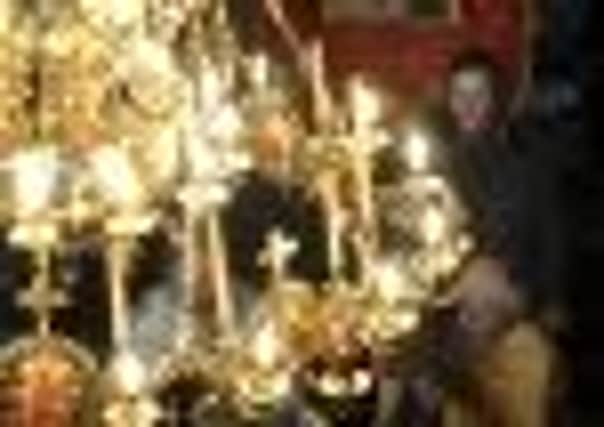Visit from Princess as Serbian culture celebrated


Princess Katarina Karageorgevitch, 52, a descendant of Queen Victoria, joined scores of worshippers on Saturday at the St John the Baptist Serbian Orthodox Church in Boothtown, Halifax, who were marking the 46th anniversary of the church.
The special service was organised as part of a nationwide programme of Lottery-supported events celebrating Serbian culture in Britain throughout this month. They include classical music concerts, poetry readings and art and icon exhibitions
Advertisement
Hide AdAdvertisement
Hide AdRoyalists, or Chetniks, who fled communist-ruled Yugoslavia at the end of the Second World War and found work in Yorkshire’s under-manned textile and coal industries, raised funds to buy the former Ackroydon Methodist Church in Heap Street in 1965 and convert it into a Serbian church awash with colour and symbolism.


Katarina’s uncle, the exiled Yugoslav King Peter, joined the dedication ceremony attended by 700 worshippers a year later. Some 8,000 people with Serbian backgrounds are now thought to live in Yorkshire and Humberside, the number swollen in recent years by immigrants escaping turmoil in the Balkans.
Katarina’s father, the late Prince Tomislav, was a hugely popular figure among exiled Serbs who had been raised to believe unswervingly in God, King and Country, and over the years he became a familiar figure at festivals and church celebrations in West Yorkshire.
Katarina’s cousin Crown Prince Alexander, now living in Belgrade and pressing for Serbia to become a constitutional monarchy, also made the journey north to be with churchgoers.
Advertisement
Hide AdAdvertisement
Hide AdGeorge Tokos, parish secretary, said: “Our church has a long history of royal visits so we were delighted Princess Katarina accepted our invitation this year, a very special year for Serbs in Yorkshire because of the Olympic Games.”
Mr Tokos, a businessman and vice president of the Serbian Council of Great Britain, was involved in talks with the Serbian Olympic Committee before the country agreed to use Sheffield and Leeds as pre-Games training camps.
The founder of Huddersfield-based Tokos Solutions, a consultancy for development and project management, said: “Serbs believe they have made a valuable contribution to multi-cultural life in Britain.
“We are proud of our achievements but in recent times the community has tended to keep a low profile because of the troubles in former Yugoslavia and the often-negative way Serbs have been portrayed in the media.
Advertisement
Hide AdAdvertisement
Hide Ad“We are keen to look forward, not back, and we hope the celebrations at our church and elsewhere in the country throughout this month will encourage people to see our community in a more positive light. “
Vule Golubovic, chairman of the Halifax church committee, said: “Serbs were seen by the West as the bad guys of Europe during the 1990s and the country is still trying to rebuild after the (Nato) bombings. The country remains in turmoil and that is sad for all Serbs.
“We hope we are now entering a happier chapter in our history.”
Katarina was officially welcomed to the church by parish priest Aleksandar Ilic, who was assisted during the service by Zarko Nedic, priest from the neighbouring Serbian Orthodox Church in Little Horton Lane, Bradford. The Mayor of Calderdale, Nader Fekri, the Yorkshire Society chairman, Keith Madeley, and Branimir Filipovic, a leading official at the Serbian Embassy in London, were among the guests.
Advertisement
Hide AdAdvertisement
Hide AdChurch function rooms were used for an exhibition of Serbian art and historic photographs of the church and community, along with folk dancing displays, live music and an igranka (dance).
During the service the princess stood close to a bust of Peter, third and last King of Yugoslavia who died in exile in the United States in 1970.
Candles lit by worshippers in tribute to loved ones, living and dead, burned brightly in two corners of the church while the huge, ornate chandelier lighting the centre of the icon-rich building, bought with financial help from members of the now-defunct Serbian National Welfare Centre in Chapeltown, Leeds, drew admiring glances from Katarina.
London-based Katarina, who works in public relations, was married to internationally-renowned QC Sir Desmond de Silva for 22 years. Sir Desmond was described as England’s top defender after footballers he represented, Wimbledon’s John Fashanu and Liverpool’s Bruce Grobbelaar, were cleared of match fixing charges in 1997. He was later dubbed the Scarlet Pimpernel after he saved a string of defendants from execution abroad.
Advertisement
Hide AdAdvertisement
Hide AdThe couple have a daughter, Victoria, now 20, named after her great great grandmother, Queen Victoria. Katarina herself is 100th in line to the British throne and a niece of Prince Philip.
Mr Tokos said: “Katarina is charming, amusing and very down to earth. It was a great pleasure speaking to her.”
In her younger days, Katarina worked at Harrods, where she was known simply as Kathy George.
Her father, Tomislav, was also renowned for his common touch. The prince set down roots in West Sussex as an apple farmer but never forgot his friends in West Yorkshire, often staying at the Serb-run Adriatic Hotel in Harehills, Leeds. He invited young Serbs from West Yorkshire to stay at his farm for summer weekends.
Advertisement
Hide AdAdvertisement
Hide AdIn 1992 Tomislav became the first member of the Yugoslav royal family to return permanently to his beloved Serbian homeland. He joined Easter celebrations at a church in Belgrade during the Nato bombing of the Serbian capital in 1999. “I will not be stopped from going to church on Easter Sunday,“ he said, defiantly, as he entered the building. “I expect to be bombed out of the church by Nato.”
Tomislav survived the warplanes but lost his battle with cancer and died in 2000 aged 72. He was buried in the royal family’s ancestral home, Oplenac. There were chants of “Stay! Stay!” from among the 3,000 mourners.